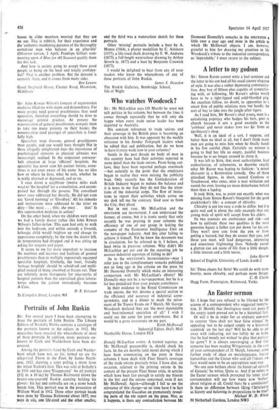Who watches Woodcock?
Sir: Mr McLachlan says (10 March) he must not talk politics in his column, but between the lines it comes through repeatedly that he will only die happy when every trade union leader has been deported to Australia.
His constant references to trade unions and their coverage in the British press is becoming an obsession with him. It was apparent by the weekly reference in his Sunday Telegraph leaders when he edited that sad publication, but do we have to have it every week now in your columns?
Surely in the past decade no body of men in this country have had their activities reported in more detail than the trade unions. From being out- laws, they have been reported perhaps overmuch —but certainly to the point that the employers began to realise they were missing the publicity boat. Only recently has the Confederation of British Industry begun to redress the balance and it is news to me that they do not like the atten- tions of the industrial corps. The flow of invita- tions to report their activities which arrive on my desk tell me the contrary. God save us from the City, they plead.
But in any case, Mr McLachlan and the SPECTATOR are inconsistent. I can understand the former, of course, but it is ironic surely -that only recently he was praising in your columns the efficiency of one of our group in leaking the contents of the Economist Intelligence Unit on the newspaper industry. And this after failing to achieve it himself. Yet he knew the document was in circulation, for he referred to it, I believe, at least twice in previous columns. Why didn't Mr McLachlan get out and do the reporting job be accuses industrial reporters of failing to do?
As to the SPECTATOR'S inconsistencies—may I refer you to the complimentary remarks published not so long ago in the column on the press by Mr Desmond Donnelly which make an interesting comparison with Mr McLachlan's efforts? Mr Donnelly may not be a newspaperman, but he is a lot less prejudiced than your present contributor.
In their evidence to the Royal Commission on trade unions, the TUC devotes a special section to the efficiency and accuracy of industrial corre- spondents, and in a dinner to mark the retire- ment of Sir Trevor Evans on 7 March, Mr George Woodcock declared they are 'the most dependable and best-informed specialists of all.' I wish I could say the same for your contributor. But it would be a gross inaccuracy on my part.
Donald McLachlan writes: A trained reporter, as Mr McDowall presumably is, should check his facts. In the six months (and more) during which I have been commenting on the press in these columns I have dealt with Fleet Street's coverage of the trade unions precisely twice. I have also, on occasion, referred to the printing unions in the context of the present Fleet Street crisis, in articles which have been fair enough to satisfy my friends in the TUC and the unions concerned, even if not Mr McDowall. Again—although I fail to see the relevance of this charge—at no time have I in fact congratulated the Guardian on prematurely reveal- ing parts of the MU report on the press. Nor, as it happens, is there any contradiction between Mr Desmond Donnelly's remarks in the SPECTATOR a little over a year ago and mine in the article to which Mr McDowall objects. I am, however, grateful to him for drawing my attention to Mr Woodcock's tribute to the industrial correspondents as 'dependable.' I must return to the subject.






























 Previous page
Previous page